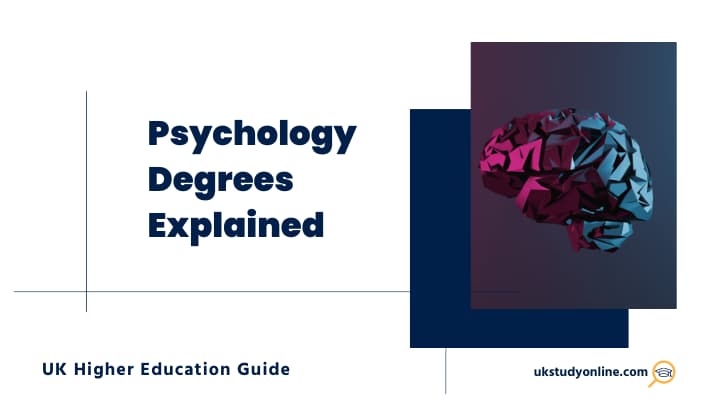What is the Study of Psychology?
Psychology is the study of the human mind and how people behave, think, and interact and how emotions and thoughts influence behaviour.
Psychology is one of the most popular undergraduate degree subjects in the UK. Reflecting this is the number and types of on-campus and Online Psychology Degrees offered by a large proportion of Universities. A degree in psychology can be the first step to becoming a chartered or clinical psychologist. It is also a valued degree in many other careers, such as social work, business or teaching.
In this article, we will cover the essentials that you should be aware of if you want to study psychology at a UK university.

What Degrees Are Available?
Psychology is a broad subject. There are many specialisations available, as well as degrees related to psychology. As a result, you will come across a wide range of course titles similar to the examples below.
- Applied psychology
- Child psychology
- Clinical psychology
- Developmental psychology
- Educational psychology
- Experimental psychology
- Forensic psychology
- Social psychology
- Sport psychology
- Psychology
- Psychology and Business
The British Psychological Society accredits a large number of courses. Accreditation means that the course covers certain areas set out in the body’s professional guidelines. This accreditation is essential if your goal is to practice as a Chartered Psychologist. Having a BPS-accredited degree or master’s is one of the requirements to practice in a clinical environment. We have more information on why the BPS accreditation is important, depending on your career goals.
What is the Difference Between BSc (Hons) and BA (Hons) Degrees in Psychology?
BA stands for Bachelor of the Arts, and BSc for Bachelor of Sciences. As the names would suggest, a BA will focus more on the social factors of psychology and a BSc on the science of the mind, for example, the biology of psychology.
However, when comparing courses, you will find that the difference may not be that great, if noticeable at all. If the BPS accredits the courses, they will need to cover specific teaching areas. For example, you will find BA courses with statistics in the syllabus, as this is required to gain BPS accreditation.
It is a bit confusing, but when you compare psychology degrees, the main thing to focus on is the syllabus and accreditation and not on whether it is a BA or BSc.
Example Modules Covered
You would typically cover, in some form, the areas below during your study.
Main Components of Psychology Degree
- Research Methods – Strategies and techniques for designing experiments and surveys and analysing data.
- Statistics – analysis, interpretation, and presentation of numerical data.
- Cognition & Cognitive Processes – the process of how we learn, experience and understand.
- Biological Psychology – the biology of behaviour and how the brain and nervous system are structured.
- Developmental Psychology – how children and adults change through their lifespan.
- Social Psychology – how people’s behaviour is constructed within groups.
- Vision/ Perception – how we receive, interpret and act on visual stimuli.
As you progress through the course, you may take a specialisation in the final year that focuses on a particular area; for example, organisational psychology, in more detail.
Careers Pathways
Studying psychology can lead to a wide range of careers in business, healthcare, and the public sector. The nature of the subject and the data analysis involved means that graduates are sought after in many roles.
- Advice worker
- Careers adviser
- Counsellor
- Detective
- Human resources officer
- Market researcher
- Play therapist
- Psychotherapist
- Mental health nurse
- Counselling psychologist
- Digital analyst
- Drug and alcohol recovery practitioner
- Educational psychologist
- Forensic psychologist
- High-intensity therapist
- Mental health support worker
- Occupational psychologist
- Psychological wellbeing practitioner
Time Frames
Gaining a full psychology undergraduate degree will take three years of full-time study. Taking a part-time online course will take 6 to 8 years, depending on the time you dedicate to the course.
Online psychology courses offer the most flexibility and are ideal for students who are combining studies whilst working full-time. To complete a course part-time, working students will need to be able to dedicate around 15 hours a week to study, but this may vary throughout the year.
Traditionally university courses start in September each year, but now you can find online degrees with start dates each month or quarter.
Entry Requirements
You do not need to have a psychology A-level to gain a place in a psychology course. There are no specific A-levels required for a psychology degree, but due to the statistics and analysis involved in many courses, the following A-levels can be beneficial.
- Psychology
- Sociology
- Biology
- Mathematics
Mature Student Access
If you are a mature student and you left school without the right qualifications, then a pathway to university is to take an Access to HE course. These further education qualifications can be taken online or on-campus at local colleges. They usually take one year to complete and are the equivalent of three A-levels.
If you are already in a relevant career, some universities will consider mature students’ work experience. This means that you might be able to gain admissions with a good GCSE maths and relevant work experience. Arden University is an example of this type of admissions policy.
Costs
Typically for a full-time on-campus degree, you will be looking at tuition fees of £9,500 a year. However, online degrees can often have a lower annual cost. Whichever format you decide to study, you will be able to use the government student loan scheme to cover the fees if you are a UK resident.
